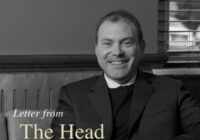Keeping it real
Playing dad to 90-odd teenage boys is not for everyone, but Hilton College Maths teacher and McKenzie housemaster Lionel Julius takes it in his stride.
Fatherhood isn’t all about being a pillar of strength. It’s also about soft skills. “It’s as much about modelling what we expect of the boys, including showing emotions, like sadness and enjoyment.
“Teenagers pick up on everything, from when you’ve had a haircut to when you’re feeling frustrated.”
If there’s one thing Lionel models excellently, it’s self-care.
An avid runner, he has four Comrades marathons and six Two Oceans under his belt.
“Running takes me into a different world. It relieves me of fatigue and boy issues, and for that half an hour or so, I can just focus on nature and placing one foot in front of the other.”
The son of a fisherman and a domestic worker, Lionel grew up in Kraaifontein, in the northern suburbs of Cape Town. The youngest of six children, he was reared in the two-bedroom house his dad built, with an outside toilet and water from a well.
Quiet and nonchalant, Lionel says he has no childhood memories of going without.
“In fact,” he says laughing, “the kids at school all wanted to swap their peanut butter jam sandwiches for mine, which had meat and fresh lettuce.”
Yet the South Africa of Lionel’s youth was oppressive and strife-torn, particularly when he was in high school at Scottsdene High.
“We had some really good teachers who encouraged us and kept us politically informed.
“In 1985 I remember getting teargassed by the riot police for illegal gatherings in the school hall; I can’t recall how many times. My friend Tony was shot in the arm with live ammunition, and one of our teachers was detained.
“Some schoolboys, including some of my cousins, went into hiding from the security police. Some of those who were tortured never recovered.”
Much as he has tried to make good choices, Lionel believes that aspects of his life have been predetermined. Like the opportunity to study at the University of the Western Cape (UWC).
“After he gave up fishing, my father worked at UWC as a groundsman, and that’s how I got the privilege to study there.”
With his teaching degree in hand, Lionel was settling into a job at a school in Mitchells Plain when the opportunity to teach in Taiwan presented itself.
At 29, having never left the country nor been on a plane, he was up for the adventure.
“Taiwan was a culture shock. To the Taiwanese, I was like Tiger Woods. They would wave and call me that in the streets,” he says, flashing his characteristically mischievous grin.
It was in Kaohsiung, at a haunt called the Green Jungle, frequented by South Africans and other foreign nationals, that Lionel met his wife Dorrianne, a South African foundation phase teacher also living in Taiwan.
Ten months later, the couple had landed teaching jobs in the UK, where another culture shock awaited.
“I lasted two months in my first job at a government school, teaching poorly behaved British adolescents. From there I went to Hertswood Academy, in Borehamwood, where there was not even an interview, they were so desperate for teachers.”
Although the second school was much like the first, at Hertswood teachers enjoyed better support and so Lionel stayed almost 10 years.
“It was there that I really learned my trade as a teacher – from behaviour management to how to teach an outstanding lesson. It was a very good growth period. I was head of Maths there and made some lifelong friends.”
The Juliuses decided to take their two children home to Cape Town. Joshua and Abbie went to Reddam in Green Point, where both their parents worked, and experienced a vastly different South Africa to the one Lionel and Dorrianne knew.
Three years later Lionel moved to Hilton to experience living on campus in a boys-only environment. He and his family have soaked up the KZN experience.
Reflecting on the past eight years, he raves about the collegial support at Hilton College. “Mike Pitchford [resident clinical psychologist] is amazing.”
Being a housemaster was challenging at first. “But as you build relationships with the boys and foster trust, it becomes easier and happier. The reward is a good relationship with every boy in the house, that sense of feeling welcomed and respected.”





